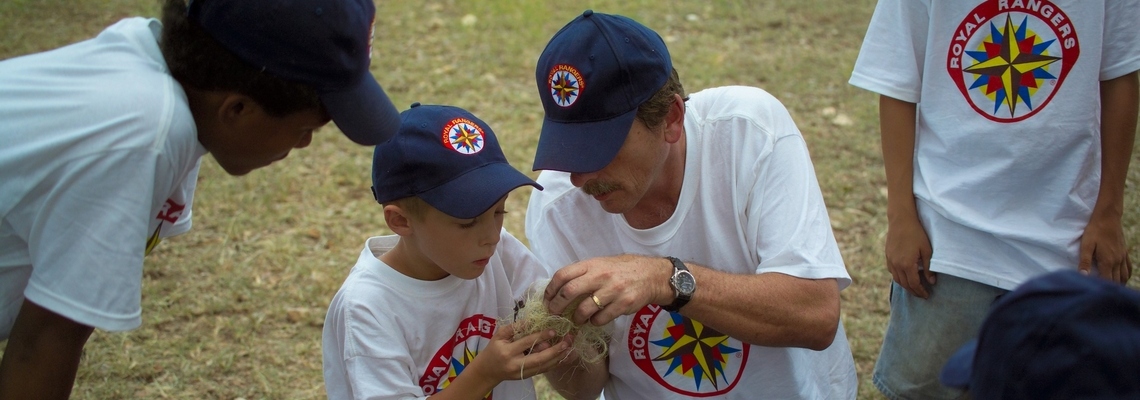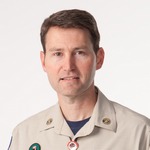
October 4, 2017
As a boy growing up on a farm in rural southwest Missouri, my childhood was full of little adventures. Skipping rocks on the pond, catching crawdads in the creek, and building forts in the woods behind the barn were common pastimes. I always looked for opportunities to enjoy my little adventures with friends and was glad to be part of any group or club that provided those opportunities.
In those days, I had the unique opportunity to participate in both Royal Rangers and scouting. My dad served as Scoutmaster for the Boy Scout troop in our area for several years, and he let me go on many of the activities with the boys even though I was too young to be a regular member. My place was with the Cub Scout pack that met on Thursday afternoons in the gym of our small 4-classroom elementary school in Halltown, Missouri. Led by two moms of boys in our group, we had a fun time together doing crafts, taking field trips, and building Pinewood Derby cars.
On Wednesday night, I went to Royal Rangers at my church. My first memory is that of being a Buckaroo. Our group wasn’t large, which was probably a good thing considering the mischief we caused, but we had an exciting time together. I later graduated to Pioneers and attended my first big Royal Rangers event - the Southern Missouri District Powwow. For me, this was a kid’s greatest adventure.
I have fond memories of both Royal Rangers and Cub Scouts as a boy, and I believe both programs even today still provide boys with great opportunities to experience new things and have fun with their friends. However, as I’ve learned more about both programs, I’ve come to understand more clearly the differences between the two. Both provide great adventures for boys, but it seems to me that they follow significantly different processes with very different objectives.
An Overview of Scouting
Scouting is composed of three primary programs—Cub Scouts, Boy Scouts, and Venture Scouts. There are additional programs available, but these three seem to be the largest and most significant divisions of the program.
Cub Scouts is for boys in grades 1-5. Boy Scouts is for boys in grades 6-12, and Venture Scouts is a program for both boys and girls, ages 14 to 21.
In Cub Scouts, parents are encouraged to participate with their boys and play a significant role in the program. Parents typically attend Cub Scout meetings and work side-by-side with their boys in completing advancement requirements. The advancement process is simple and easy to understand, and everything the boy and parent need to complete the process is in the boy’s handbook. Almost all requirements are completed as a group in class or on group outings, such as trips to the zoo, family campouts, or service activities.
Webelos is the name given to the group for boys in grades 3-4. Webelos is still considered part of Cub Scouts although the advancement system requires boys to do a little more work on their own and parents play less of a roll. Webelos is a type of transition group between Cub Scouts and Boy Scouts.
In Boy Scouts, the boys are expected to work much more independently, completing merits on their own at home or with the help of a Merit Badge Counselor, who helps individual boys or small groups complete merit requirements. Boy Scouts conduct many of their activities as a patrol under the leadership of other boys, which they elect as their leaders. Much of the Boy Scout program is focused on earning merits and pursuing the Eagle Scout award, the highest award earned in Boy Scouts.
Venture Scouts follow a different but similar advancement process. Since this group includes both boys and girls as old as 20 years of age, much of their focus is on leadership development and working as a team.
Character development and citizenship have always been central elements in all scouting programs and that tradition carries on to this day. Overall, the scouting program seems to focus on these primary objectives:
- Providing opportunities for parents to do fun things with their kids, especially in Cub Scouts (although not as much in programs for older boys)
- Providing a clear advancement process where boys learn skills and have fun with friends while receiving advancement recognition.
- Developing leadership by providing opportunities for boys to work as a patrol.
While these objectives all have significant value and in many ways run parallel the objectives of Royal Rangers, significant differences do exist.
Scouting & Royal Rangers Compared
Royal Rangers is first and foremost a church ministry. As such, the ultimate objective of any Royal Rangers program is the same as all other church ministries—to fulfill the Great Commission by making disciples of all the nations. The core objective of Royal Rangers is not just character development, citizenship, or learning new skills even though all are included as objectives of the program. The core objective of Royal Rangers is discipleship—to provide boys with a clear picture of biblical manhood according to the model of Jesus Christ and with a process by which to pursue it. Providing boys with a picture and a process for Christlike manhood is Royal Rangers.
The way we accomplish this objective in many ways resembles the programs of scouting.
- Both programs provide parents with opportunities to participate in activities with their sons and do fun things together although in Royal Rangers this is typically limited to activities outside the weekly meetings since most churches conduct their Royal Rangers programs as part of their regular midweek services when adults are typically involved in other activities.
- Both programs provide an advancement system where boys learn new skills and do fun things together. However, the Royal Rangers system provides greater flexibility in choosing the merits and activities the group will do since fewer activities are pre-determined (i.e., required) by the system.
- Both programs employ the patrol system as the process for developing junior leaders within the local group.
- Both programs provide uniform options to enable local groups to choose the most appropriate attire for the activities they engage in.
- Both programs encourage groups to engage in service activities that benefit their local communities.
- Both programs typically provide regular weekly meetings where boys come together to have fun and learn new skills.
However, the Royal Rangers program includes some key features not found in scouting that reflect the core purpose of the program.
Every Royal Rangers meeting includes a Bible study or devotion. These spiritual messages are tailored to meet the unique interests and needs of boys and provide the biblical foundation for the discipleship process.
In addition to the Bible studies, the skill merits also play a role in providing boys with a picture of biblical manhood. The flexibility of the Royal Rangers advancement system not only enables groups to select the merits they will complete together but also provides opportunities for a variety of men from within the church to be involved with the boys, each one presenting a skill they know well. Rather than having the Royal Rangers leader teach every merit, the program allows for other men to come into the meetings and teach specialized topics on a short-term basis. This introduces boys to community of Christlike men who provide visual models of biblical manhood.
This flexibility also enables the outpost leader to provide a program that meets the needs and interests of boys in his community. Just as the mission of the church is to make disciples of every person, it is the mission of Royal Rangers to reach EVERY BOY with the gospel and provide him with the picture and process for manhood. To reach every boy, we must provide a program with the diversity that provides something for every boy. Camping and outdoor adventures have long been a major part of Royal Rangers, just as it has been for scouting. To reach every boy, we must be more than “good campers.” We must provide boys with a community of Christlike men, sharing their skills and interests in a wide variety of areas, so that every boy feels there’s a place in Royal Rangers for him.
In Royal Rangers, we’ve identified five areas of common interest among boys, which we refer to as our “core competencies.” We encourage every Royal Rangers leader and outpost to provide activities that appeal to boys in all five of these areas:
- Outdoors
- Sports
- Trade Skills
- Technology
- Arts
The Central Message of Royal Rangers
We believe God made every boy unique and designed within him a unique pattern for the man he was meant to be. God has a plan for the life of every boy, a plan that will fill his heart and mind with wonder (come to give you life), shaping him into an image of manhood that reflects both that unique design and the pattern of true manhood represented in the life of Jesus Christ. As he pursues that design, he will influence others along the way and help them in the process of becoming all they were created to be as well.
Both Royal Rangers and the scouting programs provide great opportunities for boys to grow into mature, responsible, confident young men. I will always cherish my days as a boy in both programs. However, my heart today is committed to Royal Rangers since I believe it to be the best process I’ve found for transforming boys into spiritual champions. Through Royal Rangers, we can provide every boy with a picture of Christlike manhood and a process for attaining it as we partner with the Holy Spirit to grow within the heart of every boy that unique image of Christ. If we do that, we will most certainly change the world one boy at a time.

Royal Rangers USA